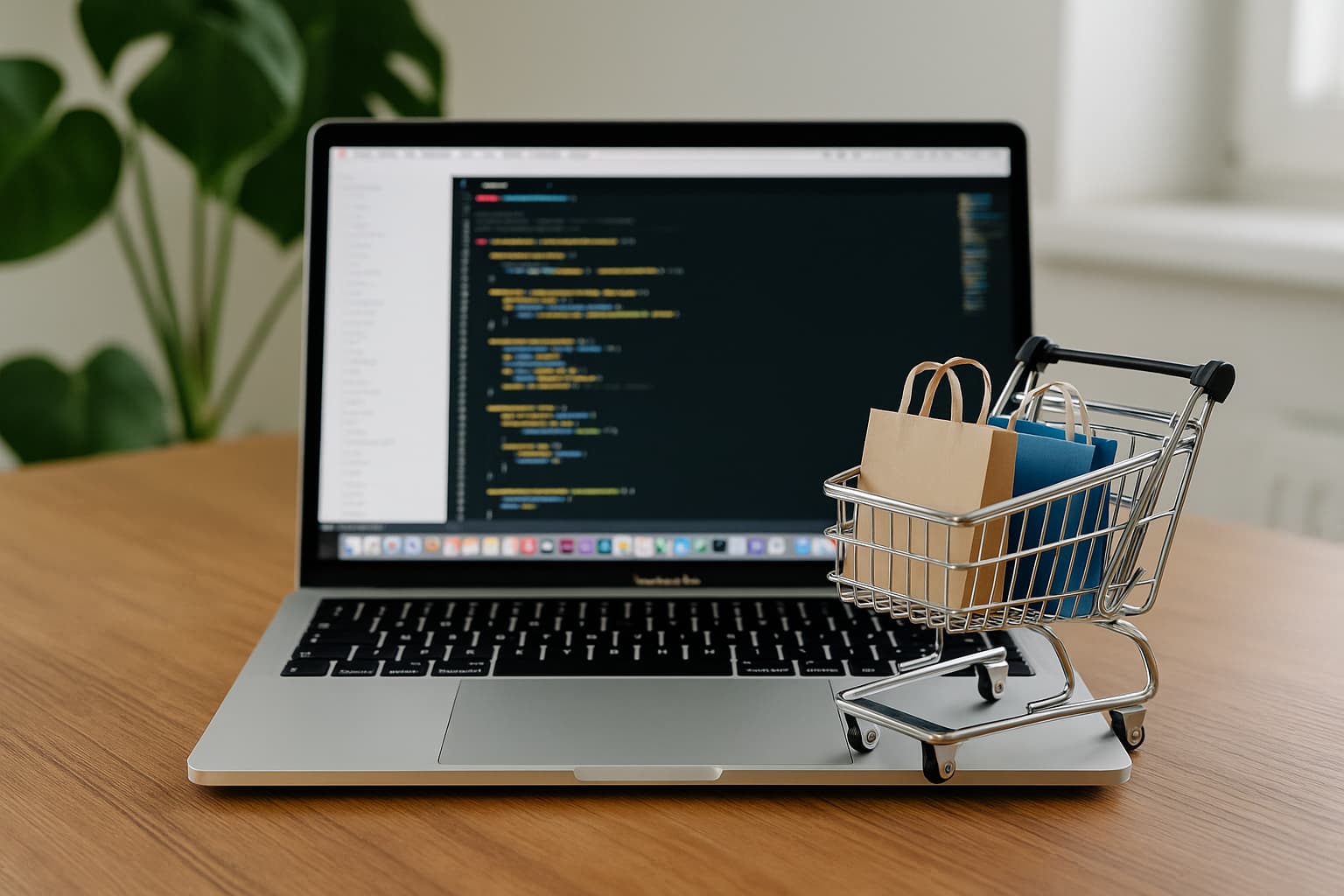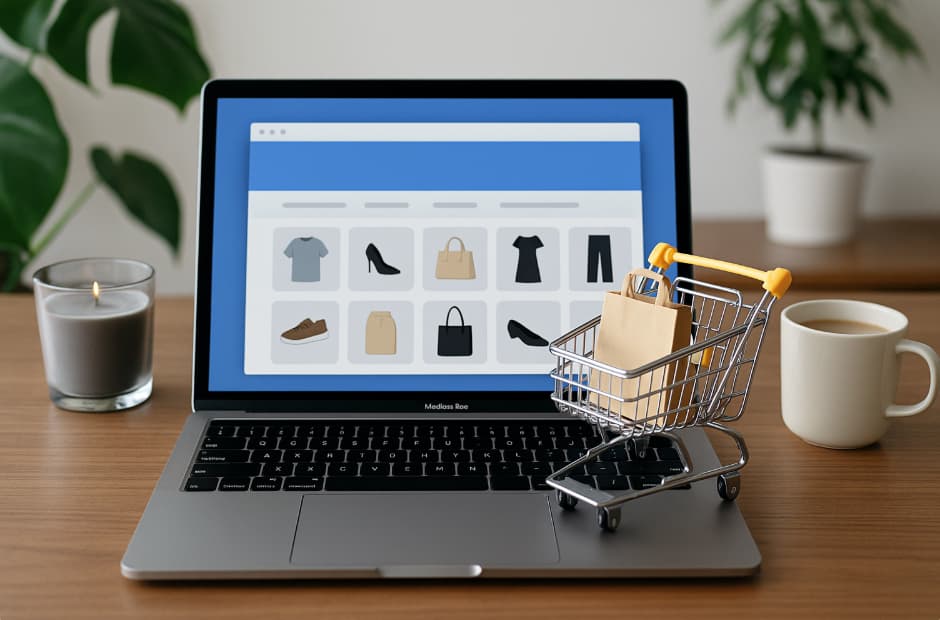
The retail industry is going through a turning point in 2025: competition is growing, customer expectations are becoming higher, and they can no longer be satisfied with just an intuitive online catalog with payment in a couple of clicks. Ultimately, buyers choose those who have been able to win their loyalty in the long term, through personalization, response speed (in all senses), bonus programs, and other extra features.
For retail business owners, this means the following: it’s time to go beyond the usual vision of what a digital platform for online shopping should be. And we, as a company that specializes in developing custom retail industry software, will share our insights on this matter below.
Retail Software Market Trends and Statistics for 2025
The global retail software market size was valued at USD 14.76 billion in 2024 and is likely to reach USD 41.53 billion by 2034, at a CAGR of 10.90%. Such rapid growth can be explained by the buyers’ desire to get more comfortable shopping conditions that are unattainable in the offline model.
And businesses developing retail software actively contribute to this: they optimize logistics, expand the product range, implement personalization at all stages of the sales funnel, etc. At the same time, they face a number of related challenges: increasing costs for the transportation of goods and their storage, a shortage of qualified personnel, and, finally, competition with global marketplaces whose reputation has been formed over decades.
Such a complex situation requires a strategic approach to development aimed at creating a solution that could cover all points of customer interaction and centralize data management.
What Is Custom Retail Software Development?
Custom retail software development implies the creation of digital solutions that are fully tailored to the unique processes and tasks of a specific business. Unlike ready-made out-of-the-box solutions that allow you to build retail software with basic functionality through their drag-and-drop interfaces, this approach implies that developers should focus, first of all, on scalability, maintaining brand identity, and seamless integration with existing systems.
Custom vs off-the-shelf solutions
If we consider off-the-shelf solutions in more detail, in general, we don’t perceive them as a bad choice. They are great to use when your business is just starting to grow, and when a quick market entry within a limited budget is a priority.
At the same time, the capabilities of such platforms are limited – some don’t allow global scaling (for example, related to the need to enter new markets), some cannot be integrated with third-party systems (especially legacy ones), some don’t support certain business models, and some require the connection of paid modules or the creation of custom ones, which, in the long term, will be more expensive than custom retail software development from scratch.

Key business benefits
To summarize the above, we can highlight the main advantages of custom solutions for retail:
- Increased efficiency (cost reduction, minimization of the human factor, etc.) achievable through end-to-end automation of regular processes;
- Increased conversions and average check, which are achieved by providing a personalized customer experience;
- Simple and quick connection of new communication channels, as well as scaling to new markets and implementing new, unique sales models;
- Full control over customer data, which can be crucial for businesses that deal with tens of thousands of transactions daily.
CheIT is well aware of all these advantages and always tries to get the most out of them in each project for the retail sector. Therefore, if you are interested in delegating custom retail application development or some of its stages to a reliable technology partner, feel free to contact us.
Types of Retail Software Solutions
Now, let’s consider several of the most popular types of retail software.
Point of Sale (POS) and inventory systems
Modern POS and inventory management systems are essentially digital sales and logistics management centers. The speed of customer service and the accuracy of accounting will depend on how extensive and well-thought-out their functionality is. In particular, we can ensure that your managers can check the balance of goods in real time and automatically generate orders to suppliers to prevent shortages or, conversely, excess purchases. We can also provide seamless integration with ERP and other eCommerce platforms to create a single system whose capabilities cover and automate the tasks of several departments at once.
E-commerce and mobile platforms
Given the overcrowding of the retail market, today the winners are not those who simply launched their online stores faster than competitors, but those who offer their visitors a truly convenient and fast service. Mobile solutions work best in this context (due to their constant presence on the screens of user devices and the functionality that can interact with their hardware). It’s also worth noting that they cope better with increased loads since they are not limited by the speed of web browsers, as is the case with regular websites.
CRM and analytics solutions
In retail, you can succeed simply because you know each of your customers better than your competitors. This is where CRM systems and analytical platforms come to the rescue: they can independently consolidate customer data and, in some cases, are even able to anticipate their needs, thereby helping to build long-term relationships. At the same time, it’s important that the system you choose provides you with not just numbers, but actionable insights, revealed from sometimes non-obvious behavioral patterns. Thus, you’ll be able to maximize your marketing efforts’ ROI and the lifetime value of customers.
Essential Features for Modern Retail Software
We would like to dedicate this paragraph to an overview of the most important features that will make your customers return to your solution again and again.
AI-powered personalization and analytics
Artificial intelligence has ceased to be a hyped technology and has become a mandatory tool for personalization in modern retail solutions. In particular, AI independently analyzes customer behavior, offers personalized discounts, and can even predict demand. Moreover, we can configure AI algorithms so that you can offer your customers what they want at the moment when they are most ready to buy.
Omnichannel integration and mobile-first design
Customers want their mobile app shopping cart to be available offline, and have the possibility to return their online purchases to the nearest physical store. This can be achieved through omnichannel integration. The result will be a natural habit to buy from your retail solution, not a competitor's.
Security and payment processing
Transaction data leaks or freezing during the payment process cost businesses both money and reputation. To prevent this, we can build a custom solution that not only complies with international PCI DSS and GDPR standards, but also your internal security policies, which cannot be implemented through off-the-shelf platforms.
Retail Software Development Process
Finally, let’s check how the retail app development process occurs in our company.
Discovery and planning phase
Work on any custom project starts with analytics and marketing research. At this stage, our team, together with your experts, defines your priority business goals and identifies pain points and bottlenecks to form a clear list of technical and non-technical requirements. This approach allows us to minimize your project budget and avoid edits when active development begins.

Development, testing, and deployment
Now, our team starts the actual development, including architecture creation, coding, design, integration with third-party systems, and testing. We usually follow Agile/Scrum methodologies, which allow product owners to validate the results of our work step by step and control the further development course. At the final stage, we deploy the product in its use environment, organize training for your personnel (if necessary), and provide you with retail software maintenance.
Development Cost Factors and ROI Considerations
The cost of developing custom retail solutions always consists of many factors: scope of work, number and complexity of integrations with third-party services, specifics of business logic, technology stack, and the UX level. In particular, a basic warehouse management application is always cheaper than a complex omnichannel system combining online and offline sales.
As for us, when discussing a project budget, we always consider it through the prism of ROI, that is, by predicting how much your operating costs will decrease, how the product will affect conversions, and how many resources you will be able to save on customer service.
If you would like to receive a more accurate estimate of your project budget, write us or book a call.
Technology Stack for Retail Software Development
After years of practice, we settled on the following solutions for retail software development:
- For the backend, we usually choose Java/.NET (optimal for large and high-load systems) or Node.js (for solutions with basic functionality);
- For the frontend, we can choose React, Angular, or Vue (it all depends on the project’s specifics);
- If we are talking about mobile development, we use Swift/Kotlin for native development and Flutter or React Native for cross-platform apps;
- Among the databases, PostgreSQL, MongoDB, and MS SQL have proven themselves to be the best – the final choice depends on the volume of data and the type of operations with it.
We can also host your solution in the cloud based on AWS, Azure, or Google Cloud, integrate AI/ML via TensorFlow/PyTorch, and much more – be sure that the choice of technologies that we can implement is almost unlimited.
How Che IT Delivers Retail Solutions
CheIT is a company that is focused on long-term technical partnerships. In particular, we understand perfectly that in retail, having an online shopping platform is not just a competitive advantage, but a practical tool for increasing revenue and optimizing workflows. Thanks to our deep expertise in retail, we always get a predictable result at the output: a digital platform that reduces your overhead costs, simplifies customer service, and stimulates the growth of the average check.
.png)







